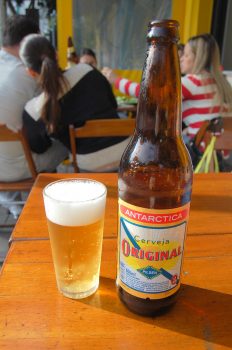Bora tomar uma? Brazilian bar culture Posted by carol on Jul 28, 2019 in Brazilian Profile, Culture, Customs, Vocabulary
You should know by now that Brazilians love to have uma cerveja (a beer), right? It doesn’t matter if they are called a bar, “boteco”, “botequim”, “birosca” or the beloved “barzinho”, there is a place for you to tomar uma (grab a beer) anytime and anywhere. If you want to know a little more about this tradition in Brazil and some curiosities about Brazilian bars, this is the place. In this post we will explain cultural issues involving this national passion. So, let’s place a table on the sidewalk and bora tomar uma?
Brazil is the country of sociability, so our cultural ties focus more on compartilhar (sharing) than on the individual. This means that here we rarely order a beer just for ourselves, but to share with everyone at the table. The same goes for food. All over the country, it is quite common to see larger portions of appetizers that usually serve more than one person. So, let’s go over some words and expressions common to the universe of Brazilian bars.
Cerveja – Beer (the most commonly found in bars are 600ml/20 oz bottles)Garrafa – Bottle
Garçom – Waiter
Mesa – Table
Cadeira – Chair
Conta – Bill, check
Copo – Glass (at least two drinking glass types are common in Brazil, one is called a ‘copo americano’ that serves about 200ml and another called ‘tulipa’, which is a long glass usually used for ‘chopp’ or draft beer – a lighter and more refreshing type of beer, perfect for very hot days)
Tomar uma – Literally, to “have one”. An informal invitation, like for grabbing a beer. But it almost never really means just one. So get ready, as you can spend the night at the bar.
Happy hour – We use it like in many English-speaking countries, that moment when you leave work to “tomar uma” before heading back home. In some establishments there are some special offers within the established time range as Happy hour.
Saidera– Similar to nightcap, the last beer ordered before the bar closes, usually the waiters will ask if you would like one. It is almost a rule to order one or a few ‘saidera’ beers (depending on the number of people at the table)
Fechar a conta – This is a very common phrase when you want to ask the waiter for the check.
Porção ou tira-gosto – These are the appetizers that bars offer their customers. It is very common to find several types of snacks depending on the region where you go. Sausages, meats, cold cuts, codfish patties, pastries, kibes, drumsticks, cassava and chips are the most typical. In coastal cities this list grows with seafood, shrimp and different types of fish.
Mais uma, por favor – “Can I get another one, please?” This expression is to be used when you want another drink for the table. We often lift the bottle and point at it when the waiter, from afar, glances over at the table. He will usually register it at a “comanda”, a piece of paper with the table consumption.
Saúde! – Literally meaning “health”. This is the word we use to toast when we arrive at the bar table or with those who just arrived.
10% – This is the percentage value of the usual tip in Brazil. It is not mandatory, but a gesture of kindness to the service of the waiters.
It is always good to remember that Brazilian bars do not always have a regular opening or closing time, usually this varies according to each one. Some of them close early and others stretch into the early hours.
So, did you enjoy our conversa de botiquim (bar talk)? Ready to order “mais uma” and feast in our “porções”? Check out these posts related to vida noturna (nightlife) and bars in Brazil to learn even more:

Build vocabulary, practice pronunciation, and more with Transparent Language Online. Available anytime, anywhere, on any device.




